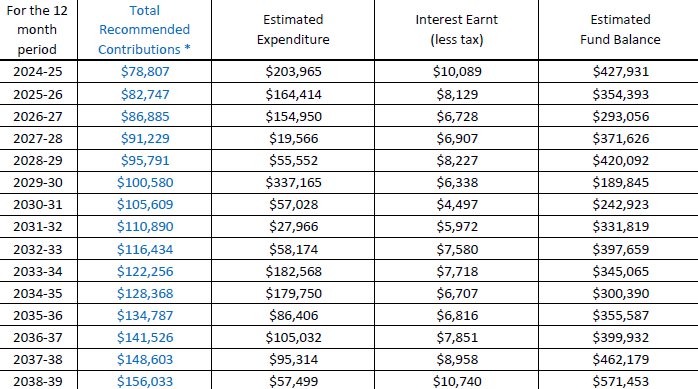Understanding Sinking Funds: Essential for Body Corporate Management
 29 Jul 2024
29 Jul 2024
 by
by Strata Sphere Management
 Strata Sphere
Strata Sphere
Understanding Sinking Funds: Essential for Body Corporate Management
Understanding the finer details of a Sinking Fund does not need to be challenging. Let’s break it down –
A Sinking Fund is a financial tool that allows Bodies Corporate to accumulate funds over a period of time. This money is specifically reserved for future capital expenditures, or expenses of a non-reoccurring nature. Expenses such as –
- Major Repairs i.e., roofing, plumbing, electrical
- Replacements i.e., lifts, common carpets, appliances
- Common Property Improvements i.e., painting, landscaping
Calculating of Sinking Fund contributions is largely based upon the Sinking Fund Forecast. A Sinking Fund Forecast is an independent report, obtained to identify and estimate the costs of necessary repairs, replacements, and maintenance for shared property assets. A Sinking Fund Forecast will also identify the suggested annual income. An example of this is below –

Legislation provides that a Body Corporate is required to budget for major capital spending for the current financial year plus the next 9 years.
Sinking Fund levies are typically paid quarterly as part of your overall levy contributions. However, the exact frequency and amount of the Sinking Fund levy is determined annually by the owners at the Body Corporate’s Annual General Meeting (AGM)
An adequate Sinking Fund provides several key advantages –
Ensuring Financial Stability: By gradually accumulating funds, a Sinking Fund safeguards a body corporate’s financial health. This reserve helps avoid unexpected costs, eliminating the need for emergency loans or burdensome special levies.
Property Value: Capital work undertaken proactively, funded by the Sinking Fund, helps preserve and even increase property values.
Informed Decision Making: When considering purchasing a property in a body corporate, understanding the sinking fund’s health can provide valuable insights into the property’s financial future.
Common Frequently Asked Questions:
How can owners see how Sinking Fund money is being spent?
Expenditure on capital works must be approved by either the body corporate committee or at a general meeting of owners, depending on the cost of the capital works. The annual financial statements, which are provided to all owners, must detail all income and expenses for both the administrative and sinking/maintenance funds.
How often should Sinking Fund Forecasts be updated?
To ensure the Body Corporate continues to raise adequate funds to keep up with increasing building, material and consultancy costs, a Sinking Fund Forecasts should typically be reviewed every 2 years. A quantity surveyor usually prepares a 15-year forecast, including annual budgets and contribution recommendations, along with a 15-year projection however, best practice is at least every 2 years. A 2-year cycle has become increasingly common, due to global supply issues and labour challenges. Additionally, insurers are eager to see Sinking Fund Forecasts updated frequently to demonstrate adequate funding for capital wok, before it is needed.
What is in a Sinking Fund Forecast?
A Sinking Fund Forecast provides a plethora of information to assist a Body Corporate is financial management over a set term. Generally, a Sinking Fund Forecast details information about the asset i.e., age, number of Lots, building materials, entitlements etc. The Forecast will provide for anticipated expenses of the common areas, on a year to year basis. The document will break down allowances towards major capital expenditure and provide a total contribution per entitlement for each annum.
Can a Body Corporate deviate from a Sinking Fund Forecast?
A Sinking Fund Forecast is considered to be a guide, to aid a Body Corporate in their Financial Management. It is the responsibility of the elected body (the Committee), to ensure preparation of satisfactory budgets, to guarantee collection of contributions to satisfy body corporate expenses.
Let's see how we can help
Queensland Strata Laws Get Pet-Friendly Makeover
7 August, 2024



